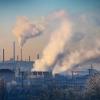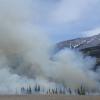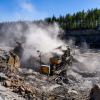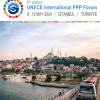News
Displaying Results 1 - 19 of 19
Mapping air pollutant emission sources in a country helps experts and decision-makers identify the most effective policies. Understanding the regional distribution of emissions is crucial for effective policy implementation.
Spatially allocating—or gridding—emissions is technically challenging.…
Representatives from countries across Central Asia and experts on the climate and clean air came together in Astana, Kazakhstan this week (11-13 June 2024) for the Sub-Regional Workshop on Integrated Planning for Climate and Air organized by the UNEP-convened Climate and Clean Air Coalition (CCAC)…
In a ground-breaking decision in December 2023, Parties to the UNECE Convention on Long-range Transboundary Air Pollution (Air Convention) agreed to revise the Protocol to Abate Acidification, Eutrophication and Ground-Level Ozone, as amended in 2012 (Gothenburg Protocol), which is expected to…
In an important move to secure the supply of essential raw materials, the European Critical Raw Materials Act (CRMA) entered into force on 23 May 2024. This legislation is a cornerstone in enhancing the EU's capabilities in sourcing, processing, and recycling critical raw materials (CRMs), which…
In the face of global crises, progressing towards Sustainable Development Goal (SDG) 16—promoting peaceful, inclusive societies, justice for all, and accountable institutions—is a cross-cutting enabler for the 2030 Agenda. SDG16 intertwines with the other SDGs, underscoring the importance of…
In her opening remarks at the 8th edition of the UNECE International PPP Forum, UNECE Executive Secretary Tatiana Molcean emphasized the urgency of accelerating the implementation of the SDGs and climate action through sustainable Public-Private Partnerships (PPPs) and infrastructure finance. …
The technology associated with low-cost sensors (LCS) to monitor air quality has seen rapid developments over the past few years. While their use becomes more widespread and some are promoting them as silver bullet for air pollution science and control, experts have advised caution.
It is clear…
Ecosystems are highly sensitive to air pollution. To sharpen emissions reductions measures under the UNECE Convention on Long-Range Transboundary Air Pollution, expert groups have started scientific and technical work to support decision-making in the context of the process to revise the Protocol…
Addressing the Tashkent International Investment Forum (2-3 May 2024), UNECE Executive Secretary Tatiana Molcean called for the mobilization of private sector investments to support the implementation of the Sustainable Development Goals (SDGs) and to foster regional cooperation in Central Asia.…
As the climate warms, wildfires are becoming more frequent. Parts of Southern Europe, such as Spain and Greece, have already seen their first wildfires of the season, with devastating impacts on local ecosystems and biodiversity. Wildfires, however, also have major impacts on global and regional…
UNECE Resource Management Week 2024 spotlighted the growing roles of the United Nations Framework Classification for Resources (UNFC) and the United Nations Resource Management System (UNRMS) in promoting sustainable development through enhanced integration and effective management of natural…
As we move beyond the midpoint of the 2030 Agenda and with only 12% of the Sustainable Development Goals (SDGs) on track, an immediate, globally coordinated push to meet the 2030 deadline is urgently needed. Sustainable Public-Private Partnerships (PPPs) and infrastructure finance are central in…
Critical minerals are essential for the energy transition as are intergenerational equity in resource management and the engagement of youth. With this in mind "Critical Minerals for the Sustainable Energy Transition: A Guidebook to Support Intergenerational Action” was launched today at the UNECE…
Following the decision of Parties to the UNECE Convention on Long-range Transboundary Air Pollution (Air Convention) to revise the Protocol to Abate Acidification, Eutrophication and Ground-Level Ozone (Gothenburg Protocol), which is expected to further strengthen efforts to reduce air pollution in…
Air pollution levels in Georgia are considered unhealthy with annual average of fine particles PM2.5 exceeding the World Health Organization's air quality guideline by at least three times.
To support Georgia in further improving its air quality management system, a new EU-funded project,…
Mapping air pollutant emission sources of a given country can help experts and decision-makers understand which policies are most viable. Spatial allocations of emissions are also important to understand where emissions are coming from on a regional level.
Spatially allocating – or gridding –…
Infrastructure projects are crucial for sustainable development, impacting not just economies but also communities and the environment. The tangible benefits they bring to people's lives can have a transformative effect and contribute to achieving the Sustainable Development Goals (SDGs). However,…
Risk is a part of our everyday lives. When we wear a helmet to ride a bike, for example, we accept a small inconvenience to reduce the risk of a fall or an accident. When a homeowner decides to retrofit their house, they incur a cost to shield against an earthquake or a flood. Faced with the COVID…
Every year we lose about 14% of the food produced before it is sold, and this does not even include the food never harvested. Even more is wasted at retail and consumer levels. At the same time, over 800 million people worldwide suffer from hunger, while food loss is a major contributor to CO2…


















